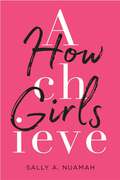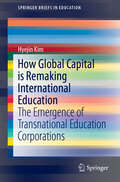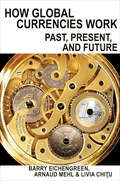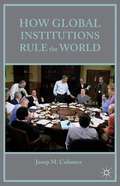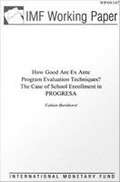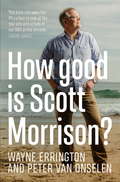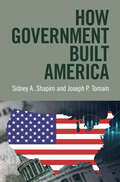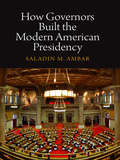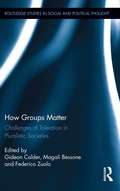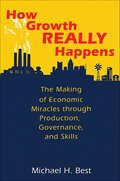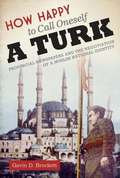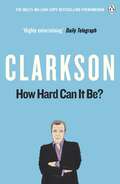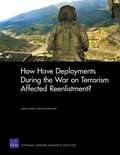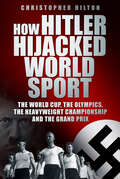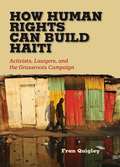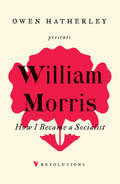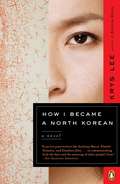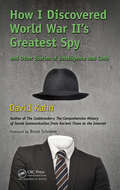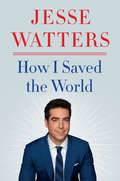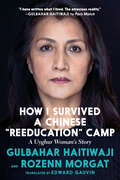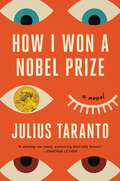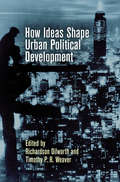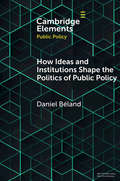- Table View
- List View
How Girls Achieve
by Sally A. NuamahThis bold and necessary book points out a simple and overlooked truth: most schools never had girls in mind to begin with. That is why the world needs what Sally Nuamah calls feminist schools, deliberately designed to provide girls with achievement-oriented identities. And she shows why doing so would help all students, regardless of their gender.
How Global Capital is Remaking International Education: The Emergence of Transnational Education Corporations (SpringerBriefs in Education)
by Hyejin KimThis book offers a first look at transnational education corporations, new firms that operate international schools. The quiet rise of transnational education corporations – or TECs – has implications for education systems around the globe, as corporate interests gain a greater stake in the way schools operate. The story of their ascendance links government policies in one corner of the world with profound effects in others. In the past decade, TECs have burst onto the international schooling scene. Private firms, publicly listed firms, and private equity groups have transformed international education into an industry valued at over USD 30 billion. Nowhere has the impact been stronger and more sudden than in Asia. The top three international education firms with a presence in Asia run more than 20 schools in East and Southeast Asia with another six in India. Each educates tens of thousands of students around the globe and has an annual revenue of over USD 300 million. TECs offer a window onto the creation of new markets and the complex positions of governments in regulating social affairs. This book helps readers to understand who these firms are, what they do and how they have grown.
How Global Currencies Work: Past, Present, and Future
by Barry Eichengreen Arnaud Mehl Livia ChituA powerful new understanding of global currency trends, including the rise of the Chinese yuanAt first glance, the modern history of the global economic system seems to support the long-held view that the leading world power’s currency—the British pound, the U.S. dollar, and perhaps someday the Chinese yuan—invariably dominates international trade and finance. In How Global Currencies Work, three noted economists provide a reassessment of this history and the theories behind the conventional wisdom.Offering a new history of global finance over the past two centuries, and marshaling extensive new data to test established theories of how global currencies work, Barry Eichengreen, Arnaud Mehl, and Livia Chiţu argue for a new view, in which several national monies can share international currency status, and their importance can change rapidly. They demonstrate how changes in technology and in the structure of international trade and finance have reshaped the landscape of international currencies so that several international financial standards can coexist. They show that multiple international and reserve currencies have in fact coexisted in the pastupending the traditional view of the British pound’s dominance prior to 1945 and the U.S. dollar’s dominance more recently.Looking forward, the book tackles the implications of this new framework for major questions facing the future of the international monetary system, from whether the euro and the Chinese yuan might address their respective challenges and perhaps rival the dollar, to how increased currency competition might affect global financial stability.
How Global Institutions Rule The World
by Josep M. ColomerThis book reviews bureau-type organizations delivering network goods, documenting how most global institutions greatly improved their effectiveness during the last few decades. In the current globalized world, the design and choice of appropriate institutional rules and procedures can result in effective and democratic global government.
How Good Are Ex Ante Program Evaluation Techniques? The Case of School Enrollment in PROGRESA
by Fabian BornhorstA report from the International Monetary Fund.
How Good is Scott Morrison?
by Wayne Errington Peter van OnselenWithout fear or favour, How Good is Scott Morrison? examines the trials and tribulations of our 30th prime minister. Investigating Morrison's unlikely rise to the liberal leadership and his miracle electoral win, van Onselen and Errington put his leadership under the spotlight.Covering Morrison's disastrous management of the catastrophic bushfire season that was highlighted by the extraordinary statement, 'I don't hold the hose, mate,' and the decision to holiday while the country burned, How Good is Scott Morrison? shows his resolve and the redemption the government's response to the pandemic brought him.Right now, Scott Morrison seems unassailable and sure to win the next election, but what exactly is his vision for Australia? A pragmatist rather than an ideologue, he is a deeply Pentecostal religious man but he doesn't wear his faith as a badge of honour. So what does he really believe in?When the history of this period is written, Morrison will certainly be seen as an election winner but will he be viewed as having had the courage and vision to change Australia for the better, or the worse?
How Government Built America
by Joseph P. Tomain Sidney A. ShapiroHow Government Built America challenges growing, anti-government rhetoric by highlighting the role government has played in partnering with markets to build the United States. Sidney A. Shapiro and Joseph P. Tomain explore how markets can harm and fail the country, and how the government has addressed these extremes by restoring essential values to benefit all citizens. Without denying that individualism and small government are part of the national DNA, the authors demonstrate how democracy and a people pursuing communal interests are equally important. In highly engaging prose, the authors describe how the government, despite the complexity of markets, remains engaged in promoting economic prosperity, protecting people, and providing an economic safety net. Each chapter focuses on a historical figure, from Lincoln to FDR to Trump, to illustrate how the government-market mix has evolved over time. By understanding this history, readers can turn the national conversation back to what combination of government and markets will best serve the country.
How Governors Built the Modern American Presidency
by Saladin M. AmbarA governor's mansion is often the last stop for politicians who plan to move into the White House. Before Barack Obama was elected president of the United States, four of his last five predecessors had been governors. Executive experience at the state level informs individual presidencies, and, as Saladin M. Ambar argues, the actions of governors-turned-presidents changed the nature of the presidency itself long ago. How Governors Built the Modern American Presidency is the first book to explicitly credit governors with making the presidency what it is today.By examining the governorships of such presidential stalwarts as Grover Cleveland, Theodore Roosevelt, Woodrow Wilson, and Franklin D. Roosevelt, political scientist Ambar shows how gubernatorial experience made the difference in establishing modern presidential practice. The book also delves into the careers of Wisconsin's Bob La Follette and California's Hiram Johnson, demonstrating how these governors reshaped the presidency through their activism. As Ambar reminds readers, governors as far back as Samuel J. Tilden of New York, who ran against Rutherford Hayes in the controversial presidential election of 1876, paved the way for a more assertive national leadership. Ambar explodes the idea that the modern presidency began after 1945, instead placing its origins squarely in the Progressive Era.This innovative study uncovers neglected aspects of the evolution of the nation's executive branch, placing American governors at the heart of what the presidency has become--for better or for worse.
How Groups Matter: Challenges of Toleration in Pluralistic Societies (Routledge Studies in Social and Political Thought #86)
by Gideon Calder Magali Bessone Federico ZuoloWhen groups feature in political philosophy, it is usually in one of three contexts: the redressing of past or current injustices suffered by ethnic or cultural minorities; the nature and scope of group rights; and questions around how institutions are supposed to treat a certain specific identity/cultural/ethnic group. What is missing from these debates is a comprehensive analysis of groups as both agents and objects of social policies. While this has been subject to much scrutiny by sociologists and social psychologists, it has received less attention from a normative and philosophical point of view. This volume asks: what problems are posed to political philosophy by a collection of individuals who act or are treated in a collective way? Focusing not only on ways in which institutions should treat groups, but also on the normative implications of considering groups as possible social agents, when acting either in vertical relations with the state or in horizontal relations with other groups (or individuals), this book explores these issues from both theoretical and practical perspectives. Contributors address both the nature of political and social philosophy itself, and the ways in which specific issues – affirmative action, race, religion and places of worship, the rights of states – have become political and social priorities.
How Growth Really Happens: The Making of Economic Miracles through Production, Governance, and Skills
by Michael H. BestA groundbreaking study that shows how countries can create innovative, production-based economies for the twenty-first centuryAchieving economic growth is one of today's key challenges. In this groundbreaking book, Michael Best argues that to understand how successful growth happens we need an economic framework that focuses on production, governance, and skills.This production-centric framework is the culmination of three simultaneous journeys. The first has been Best's visits to hundreds of factories worldwide, starting early as the son of a labor organizer and continuing through his work as an academic and industrial consultant. The second is a survey of two-hundred years of economic thought from Babbage to Krugman, with stops along the way for Marx, Marshall, Young, Penrose, Richardson, Schumpeter, Kuznets, Abramovitz, Keynes, and Jacobs. The third is a tour of historical episodes of successful and failed transformations, focusing sharply on three core elements—the production system, business organization, and skill formation—and their interconnections. Best makes the case that government should create the institutional infrastructures needed to support these elements and their interconnections rather than subsidize individual enterprises. The power of Best's alternative framework is illustrated by case studies of transformative experiences previously regarded as economic "miracles": America's World War II industrial buildup, Germany's postwar recovery, Greater Boston's innovation system, Ireland's tech-sector boom, and the rise of the Asian Tigers and China.Accessible and engaging, How Growth Really Happens is required reading for anyone who wants to advance today's crucial debates about industrial policy, free trade, outsourcing, and the future of work.
How Happy to Call Oneself a Turk
by Gavin D. BrockettThe modern nation-state of Turkey was established in 1923, but when and how did its citizens begin to identify themselves as Turks? Mustafa Kemal Ataturk, Turkey's founding president, is almost universally credited with creating a Turkish national identity through his revolutionary program to "secularize" the former heartland of the Ottoman Empire. Yet, despite Turkey's status as the lone secular state in the Muslim Middle East, religion remains a powerful force in Turkish society, and the country today is governed by a democratically elected political party with a distinctly religious (Islamist) orientation. In this history, Gavin D. Brockett takes a fresh look at the formation of Turkish national identity, focusing on the relationship between Islam and nationalism and the process through which a "religious national identity" emerged. Challenging the orthodoxy that Ataturk and the political elite imposed a sense of national identity from the top down, Brockett examines the social and political debates in provincial newspapers from around the country. He shows that the unprecedented expansion of print media in Turkey between 1945 and 1954, which followed the end of strict, single-party authoritarian government, created a forum in which ordinary people could inject popular religious identities into the new Turkish nationalism. Brockett makes a convincing case that it was this fruitful negotiation between secular nationalism and Islam--rather than the imposition of secularism alone--that created the modern Turkish national identity.
How Hard Can It Be?: The World According to Clarkson Volume 4 (The World According to Clarkson)
by Jeremy ClarksonHow Hard Can it Be? is the fourth hilarious volume in Jeremy Clarkson's The World According to Clarkson series.How hard can it be...To build a power station without upsetting the eco-mentalists? To seek world domination if you've been hit the ugly stick? For the Met Office to get yesterday's weather right?In volume four of The World According to Clarkson, Jeremy Clarkson pours scorn on the nonsensical, the dumb, the idiotic and the plain foolish in his continuing quest to discover where exactly we've all gone wrong.Along the way he ponders:• Whether conquering France might solve the immigration problem• What happened when you ignore proper warning labels • What would happen if we turned the internet offOften controversial, frequently scathing but always funnier than James May, Jeremy Clarkson shows us how we could so easily make the world a better place. Praise for Jeremy Clarkson:'Brilliant . . . laugh-out-loud' Daily Telegraph'Outrageously funny . . . will have you in stitches' Time OutNumber-one bestseller Jeremy Clarkson writes on cars, current affairs and anything else that annoys him in his sharp and funny collections. Born To Be Riled, Clarkson On Cars, Don't Stop Me Now, Driven To Distraction, Round the Bend, Motorworld, and I Know You Got Soul are also available as Penguin paperbacks; the Penguin App iClarkson: The Book of Cars can be downloaded on the App Store.Jeremy Clarkson because his writing career on the Rotherham Advertiser. Since then he has written for the Sun and the Sunday Times. Today he is the tallest person working in British television, and is the presenter of the hugely popular Top Gear.
How Have Deployments During the War on Terrorism Affected Reenlistment?
by James Hosek Paco MartorellThis research sought to understand how recent deployments have affected reenlistment by examining trends in deployments and reenlistments, developing a theoretical model, and conducting an econometric analysis of survey and administrative data to identify the effect of deployment, by service, on reenlistment. It also examined the role of reenlistment bonuses in maintaining reenlistment levels during the war on terrorism.
How Have Deployments During the War on Terrorism Affected Reenlistment?
by James Hosek Paco MartorellThis research sought to understand how recent deployments have affected reenlistment by examining trends in deployments and reenlistments, developing a theoretical model, and conducting an econometric analysis of survey and administrative data to identify the effect of deployment, by service, on reenlistment. It also examined the role of reenlistment bonuses in maintaining reenlistment levels during the war on terrorism.
How Hitler Hijacked World Sport: The World Cup, the Olympics, the Heavyweight Championship and the Grand Prix
by Christopher HiltonAdolf Hitler understood the importance of sport, and exercised his malign and dangerous influence to try to co-opt it for the Nazi cause. He intended to own the Olympic movement, housing it permanently in Berlin from 1940 in a stadium seating 450,000 people. His hijack of the 1936 Games remains one of sport’s most controversial events, using it as he did to promote Aryan supremacy and showcase the Nazi state. Austria was forced to withdraw from the 1938 football World Cup just days before it started because the country no longer existed. The boxing matches between Joe Louis and Max Schmeling in 1936 and 1938 came to represent democracy versus fascism. German technology crushed all comers in Grand Prix racing, as well as the Isle of Man TT. A government ministry was even set up to use physical fitness to prepare the population for war. Hitler understood that sport has many uses: this is how he used it.
How Human Rights Can Build Haiti: Activists, Lawyers, and the Grassroots Campaign
by Fran QuigleyA cataclysmic earthquake, revolution, corruption, and neglect have all conspired to strangle the growth of a legitimate legal system in Haiti. But as How Human Rights Can Build Haiti demonstrates, the story of lawyers-activists on the ground should give us all hope. They organize demonstrations at the street level, argue court cases at the international level, and conduct social media and lobbying campaigns across the globe. They are making historic claims and achieving real success as they tackle Haiti's cholera epidemic, post-earthquake housing and rape crises, and the Jean-Claude Duvalier prosecution, among other human rights emergencies in Haiti. The only way to transform Haiti's dismal human rights legacy is through a bottom-up social movement, supported by local and international challenges to the status quo. That recipe for reform mirrors the strategy followed by Mario Joseph, Brian Concannon, and their clients and colleagues profiled in this book. Together, Joseph, Concannon, and their allies represent Haiti's best hope to escape the cycle of disaster, corruption, and violence that has characterized the country's two-hundred-year history. At the same time, their efforts are creating a template for a new and more effective human rights-focused strategy to turn around failed states and end global poverty.
How Human Rights Can Build Haiti: Activists, Lawyers, and the Grassroots Campaign
by Fran QuigleyA cataclysmic earthquake, revolution, corruption, and neglect have all conspired to strangle the growth of a legitimate legal system in Haiti. But as How Human Rights Can Build Haiti demonstrates, the story of lawyers-activists on the ground should give us all hope. They organize demonstrations at the street level, argue court cases at the international level, and conduct social media and lobbying campaigns across the globe. They are making historic claims and achieving real success as they tackle Haiti's cholera epidemic, post-earthquake housing and rape crises, and the Jean-Claude Duvalier prosecution, among other human rights emergencies in Haiti. The only way to transform Haiti's dismal human rights legacy is through a bottom-up social movement, supported by local and international challenges to the status quo. That recipe for reform mirrors the strategy followed by Mario Joseph, Brian Concannon, and their clients and colleagues profiled in this book. Together, Joseph, Concannon, and their allies represent Haiti's best hope to escape the cycle of disaster, corruption, and violence that has characterized the country's two-hundred-year history. At the same time, their efforts are creating a template for a new and more effective human rights-focused strategy to turn around failed states and end global poverty.
How I Became A Socialist
by William MorrisThe definitive collection of political writings from William MorrisWilliam Morris is famous as a designer, poet and artist, but his work as a political thinker and activist is little known. This collection, the first of his political writings published for nearly 50 years, shows Morris as one of the most original and inspiring socialist intellectuals of his generation.Covering essays and lectures ranging through the relation between art and politics, to his visions for a socialist society and his strident anti-imperialism, this is an essential volume which shows Morris at his engaged and dazzling best.
How I Became a North Korean: A Novel
by Krys LeeNamed one of the most anticipated books of the second half of 2016 by The Millions"With How I Became a North Korean, Krys Lee takes us into urgent and emotional novelistic terrain...with heart and passion, Lee forges a world no other writer could create, one where the only response to longing and loss is learning to trust and hope again." -Adam Johnson, Pulitzer Prize and National Book Award-winning author of The Orphan Master's Son and Fortune Smiles"This is one of the best books I've read in a good long while. While North Korea is at the center of the novel, the themes of love, family and our debt to our fellow human beings will resonate universally." -Gary Shteyngart, author of Super Sad True Love Story and Little Failure Yongju is an accomplished student from one of North Korea's most prominent families. Jangmi, on the other hand, has had to fend for herself since childhood, most recently by smuggling goods across the border. Then there is Danny, a Chinese-American teenager whose quirks and precocious intelligence have long made him an outcast in his California high school. These three disparate lives converge when they flee their homes, finding themselves in a small Chinese town just across the river from North Korea. As they fight to survive in a place where danger seems to close in on all sides, in the form of government informants, husbands, thieves, abductors, and even missionaries, they come to form a kind of adoptive family. But will Yongju, Jangmi and Danny find their way to the better lives they risked everything for? Transporting the reader to one of the least-known and most threatening environments in the world, and exploring how humanity persists even in the most desperate circumstances, How I Became a North Korean is a brilliant and essential first novel by one of our most promising writers.From the Hardcover edition.
How I Discovered World War II's Greatest Spy and Other Stories of Intelligence and Code: And Other Stories Of Intelligence And Codes
by David KahnThis book recounts the desperate efforts to gather information during World War II and the Cold War. The author provides insight into the dark realm of intelligence and code that will fascinate cryptographers, intelligence personnel, and the millions of people interested in military history, espionage adventure, and world affairs. David Kahn is universally regarded as the dean of intelligence historians. Authoritative and addictively readable, this book, by revealing the past, helps guide present and future intelligence efforts.
How I Saved the World
by Jesse WattersThe conservative political commentator shares his story—and his outlook on America’s future—in this #1 New York Times bestseller.In How I Saved the World, Jesse Watters takes readers on a tour of his life from basement-dwelling Fox minion to pampered champion of right-thinking Americans. He has divined great truths about the nature of our country while stumbling across beaches asking oblivious college students basic political questions and while stumbling out of Air Force One with the President.Interspersed are his thoughtful suggestions for overcoming left-wing radicalism, maintaining American democracy, moving beyond aging hippies (like his long-suffering, loving parents), saving the world from social justice warriors and the deep state—all while smirking his way through life in only the nicest way. Watters outlines the stark choice ahead of us between all-American hamburgers and leftist Green New Deal breadlines (okay, maybe that one is a no-brainer) and shows the way for order and fairness to be restored. A manifesto and a call-to-arms from a man for all seasons, How I Saved the World is a hilarious, enlightening, entertaining book with a reasonable chance of winning a Nobel Prize in every category, even chemistry.
How I Survived a Chinese "Reeducation" Camp: A Uyghur Woman's Story
by Gulbahar Haitiwaji Rozenn MorgatThe first memoir about the "reeducation" camps by a Uyghur woman. &“I have written what I lived. The atrocious reality.&”— Gulbahar Haitiwaji to Paris MatchSince 2017, more than one million Uyghurs have been deported from their homes in the Xinjiang region of China to &“reeducation camps.&” The brutal repression of the Uyghurs, a Turkish-speaking Muslim ethnic group, has been denounced as genocide, and reported widely in media around the world. The Xinjiang Papers, revealed by the New York Times in 2019, expose the brutal repression of the Uyghur ethnicity by means of forced mass detention—the biggest since the time of Mao. Her name is Gulbahar Haitiwaji and she is the first Uyghur woman to write a memoir about the 'reeducation' camps. For three years Haitiwaji endured hundreds of hours of interrogations, torture, hunger, police violence, brainwashing, forced sterilization, freezing cold, and nights under blinding neon light in her prison cell. These camps are to China what the Gulags were to the USSR. The Chinese government denies that they are concentration camps, seeking to legitimize their existence in the name of the &“total fight against Islamic terrorism, infiltration and separatism,&” and calls them &“schools.&” But none of this is true. Gulbahar only escaped thanks to the relentless efforts of her daughter. Her courageous memoir is a terrifying portrait of the atrocities she endured in the Chinese gulag and how the treatment of the Uyghurs at the hands of the Chinese government is just the latest example of their oppression of independent minorities within Chinese borders. The Xinjiang region where the Uyghurs live is where the Chinese government wishes there to be a new &“silk route,&” connecting Asia to Europe, considered to be the most important political project of president Xi Jinping.
How I Won a Nobel Prize: A Novel
by Julius TarantoNamed One of the Best Books of the Year by VOGUE and VOX A "very funny, very good" (B. J. Novak) debut novel about a graduate student who follows her disgraced mentor to a university that gives safe harbor to scholars of ill repute, igniting a crisis of work and a test of her conscience (and marriage) Helen is one of the brightest minds of her generation: a young physicist on a path to solve high-temperature superconductivity (which could save the planet). When she discovers that her brilliant adviser is involved in a sex scandal, Helen is torn: should she give up on her work with him? Or should she accompany him to a controversial university, founded by a provocateur billionaire, that hosts academics other schools have thrown out? Helen decides she must go—her work is too important. She brings along her partner, Hew, who is much less sanguine about living on an island where the disgraced and deplorable get to operate with impunity. On campus, Helen finds herself drawn to an iconoclastic older novelist, while Hew stews in an increasingly radical protest movement. Their rift deepens until both confront choices that will reshape their lives—and maybe the world. Irreverent, generous, anchored in character, and provocative without being polemical, How I Won a Nobel Prize illuminates the compromises we&’ll make for progress, what it means to be a good person, and how to win a Nobel Prize. Turns out all of it would be simple—if you could run the numbers.
How Ideas Shape Urban Political Development (The City in the Twenty-First Century)
by Richardson Dilworth Timothy P. R. WeaverA collection of international case studies that demonstrate the importance of ideas to urban political developmentIdeas, interests, and institutions are the "holy trinity" of the study of politics. Of the three, ideas are arguably the hardest with which to grapple and, despite a generally broad agreement concerning their fundamental importance, the most often neglected. Nowhere is this more evident than in the study of urban politics and urban political development.The essays in How Ideas Shape Urban Political Development argue that ideas have been the real drivers behind urban political development and offer as evidence national and international examples—some unique to specific cities, regions, and countries, and some of global impact. Within the United States, contributors examine the idea of "blight" and how it became a powerful metaphor in city planning; the identification of racially-defined spaces, especially black cities and city neighborhoods, as specific targets of neoliberal disciplinary practices; the paradox of members of Congress who were active supporters of civil rights legislation in the 1950s and 1960s but enjoyed the support of big-city political machines that were hardly liberal when it came to questions of race in their home districts; and the intersection of national education policy, local school politics, and the politics of immigration. Essays compare the ways in which national urban policies have taken different shapes in countries similar to the United States, namely, Canada and the United Kingdom. The volume also presents case studies of city-based political development in Chile, China, India, and Africa—areas of the world that have experienced a more recent form of urbanization that feature deep and intimate ties and similarities to urban political development in the Global North, but which have occurred on a broader scale.Contributors: Daniel Béland, Debjani Bhattacharyya, Robert Henry Cox, Richardson Dilworth, Jason Hackworth, Marcus Anthony Hunter, William Hurst, Sally Ford Lawton, Thomas Ogorzalek, Eleonora Pasotti, Joel Rast, Douglas S. Reed, Mara Sidney, Lester K. Spence, Vanessa Watson, Timothy P. R. Weaver, Amy Widestrom.
How Ideas and Institutions Shape the Politics of Public Policy (Elements in Public Policy)
by Daniel BélandThis Element provides a critical review of existing literature on the role of ideas and institutions in the politics of public policy with the aim of contributing to the study of the politics of public policy. Because most policy scholars deal with the role of ideas or institutions in their research, such a critical review should help them improve their knowledge of crucial analytical issues in policy and political analysis. The following discussion brings together insights from both the policy studies literature and new institutionalism in sociology and political science, and stresses the explanatory role of ideas and institutions.
